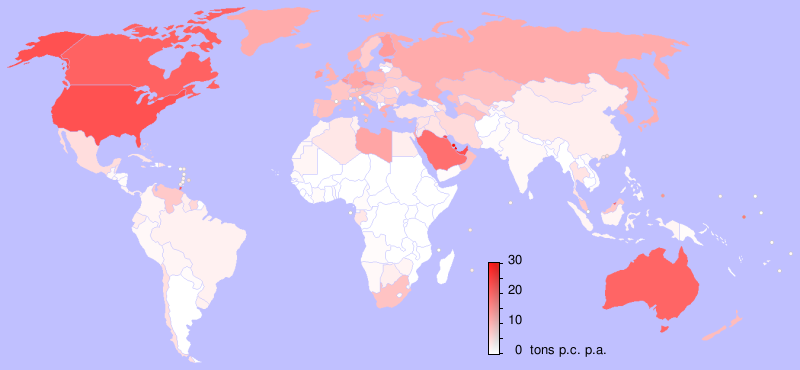The Climate Change Conundrum
Today's Policy slate features an original piece by Lee Lane of the Hudson Institute. Lane argues that we shouldn't expect science to trump politics when it comes to global climate change: China and India, which account for an ever-increasing proportion of the problem, are not going to give up on economic development just to reduce global warming, no matter how they assess the scientific claims of the IPCC.
It's easy enough to see the scope of the problem. Here's a graph of global carbon emissions since 1900:

And here's a graph of emissions just from the U.S. in the last two decades:

Essentially, we've managed to stabilize our carbon output, but the rest of the world is polluting more and more. This might seem to suggest a solution: We should keep doing what we're doing, and they should shape up. But that idea breaks down as soon as you look at carbon emissions on a per capita basis:

The problem is obvious. Developed countries are not going to cut their emissions to match those of poor countries -- that would involve throwing away decades upon decades of economic development. But if those of us in rich nations aren't willing to live in poverty for the good of the planet, we can't expect other people to, either. And if we don't expect other people to stay in poverty, we're deluding ourselves to think that our efforts here at home make much of a difference: Capping our emissions at their current levels, or even reducing them a bit, is nice -- but any improvement achieved this way pales in comparison with the carbon added to the atmosphere as other countries with far higher populations rise to our levels.
I'm not a climate-policy expert and I won't pretend to have solutions. But perhaps developed nations should focus less on cutting their own emissions and more on subsidizing the use of cleaner energy in the developing world. The question should be how much carbon we can keep from entering the atmosphere for a given amount of money, no matter where in the world the reduction takes place.
Robert VerBruggen is editor of RealClearPolicy. Twitter: @RAVerBruggen




